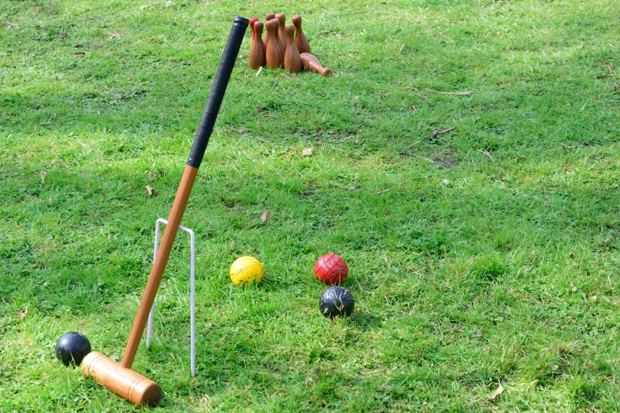I have always been what I suppose one could call a weed, and a cowardly one at that. I never liked sports and was never any good at them. When fielding at cricket at my prep school, I used to while away time making daisy-chains. Of my part in football one prep-school report merely said, to my mother’s great amusement, ‘Chancellor prefers to avoid the ball.’ At my public school, where you had to choose between rowing and cricket, I chose rowing, but only because I was just small enough to get away with being a cox, which only involved sitting in the stern of a boat and bellowing orders at the oarsmen who were doing all the work.
But there was one sport at which from an early age I found that I was rather good, and that was the game of croquet — a game now reportedly threatened with extinction, in which 74 per cent of people have ‘no interest’, and of which one in 20 now haven’t even heard. I started to play at about the age of seven when I stayed with my grandparents at their home in Lanarkshire. Being a small boy, I couldn’t swing the mallet between my legs in the normal fashion but swung it from the side like a golf club, a habit I have never managed to break. Other players find this disconcerting, which is all to the good, since success at croquet depends to a great extent on one’s ability to unnerve one’s opponents.
Croquet is popularly regarded as a genteel sport played with exquisite manners by the well-to-do on their beautifully mown lawns. When John Prescott, then deputy prime minister, was photographed in 2006 standing with a croquet mallet in the garden at Dorneywood, the Times commented, ‘The sight of the ageing class warrior playing croquet at his country retreat was an incongruity to compete with Marie Antoinette frolicking in the grounds of the Petit Trianon dressed as a milkmaid.’ But that was misleading. Croquet, it is true, requires a lawn, which suggests a degree of affluence among those who play it, but you have to be much richer to own a tennis court, and nobody regards tennis as elitist.
A greater misconception is that croquet is genteel. It is, in fact, one of the most vicious of games. To quote Herbert Swope, the American gambler and legendary newspaperman, on whose Long Island estate Groucho Marx and Dorothy Parker are said to have played it with unsportsmanlike rivalry in the 1920s, croquet ‘gives release to all the evil in you. It makes you want to cheat …it’s a good game.’ In the United States, in the late 19th century, croquet enthusiasts far outnumbered tennis players; and if tennis eventually came out on top, this was largely because of croquet’s unsavoury reputation. According to one American history of the game, ‘it had become associated with gambling, drinking, and philandering to such an extent that it was banned in Boston by one Reverend Skinner’, and there were several articles in the American press calling for its suppression as an ‘immoral practice’.
Croquet, which seems to have arrived in England from Ireland in the 1850s, never earned such a low reputation in this country, but it is a nasty game nevertheless. I don’t think any other activity has ever made me so angry and close to violence. It is a game designed to cause distrust and resentment among even the best of friends. The rules tend to vary according to the whims of the host, the boundaries of the lawn are often vague, cheating is tempting and difficult to spot, and the practice of impeding one’s opponent’s progress by hitting his ball out of play can seem to the victim both cruel and vindictive. It is, therefore, an excellent game for people who, like myself, lack athletic prowess but are endowed with low cunning and ruthlessness. The late Auberon Waugh was another such, but fortunately our friendship managed to survive our sometimes tense encounters on the croquet lawn.
According to a report in the Times, research indicates that croquet could become extinct by 2037 if current trends continue. It seems to me that the best hope for its survival is for its ‘evil’ qualities to become better known. If everyone realised how nasty it was, it might become very popular indeed.






Comments